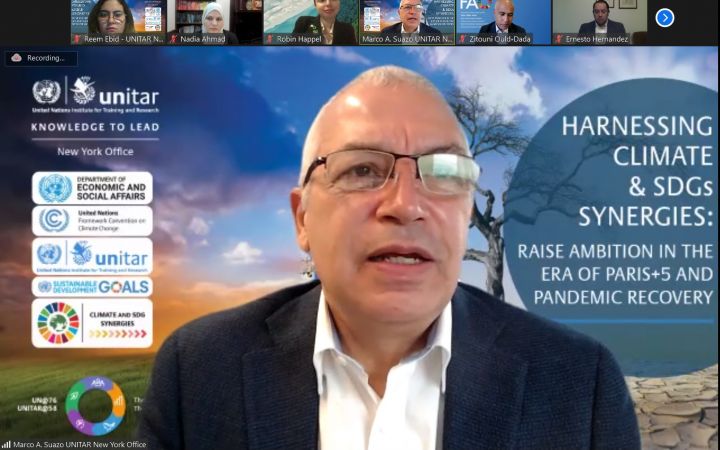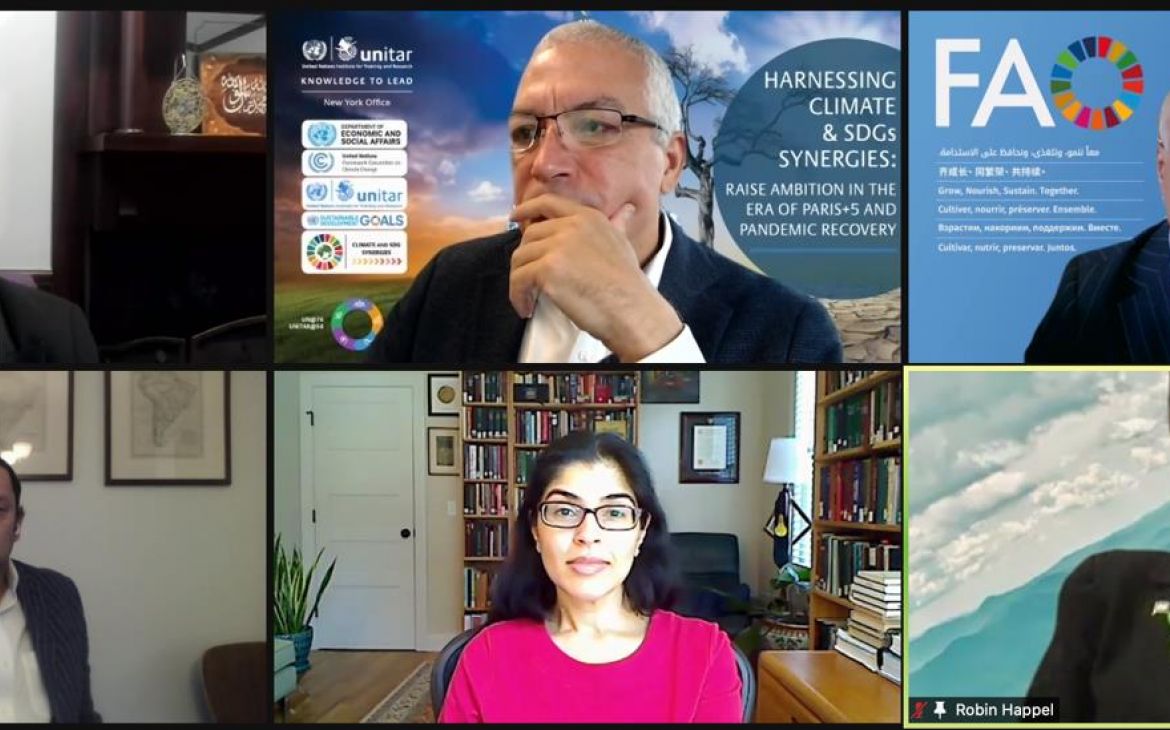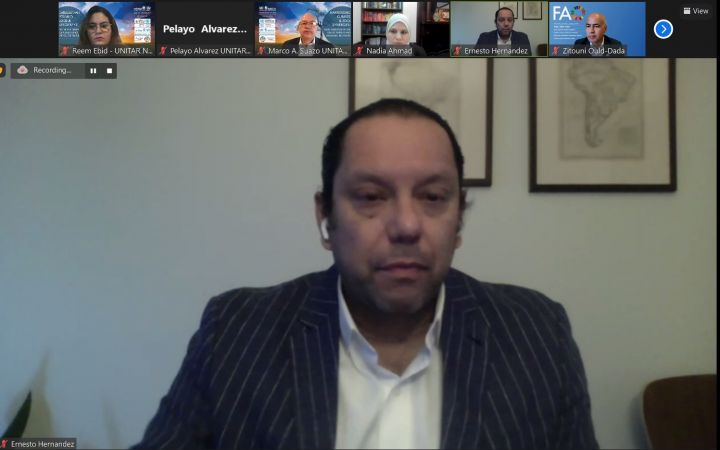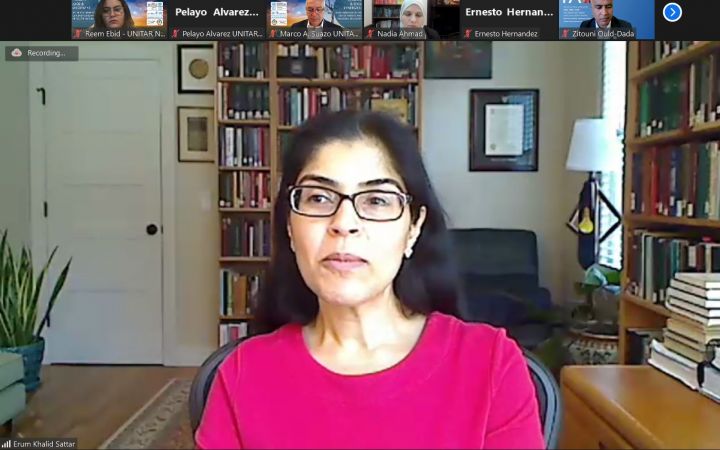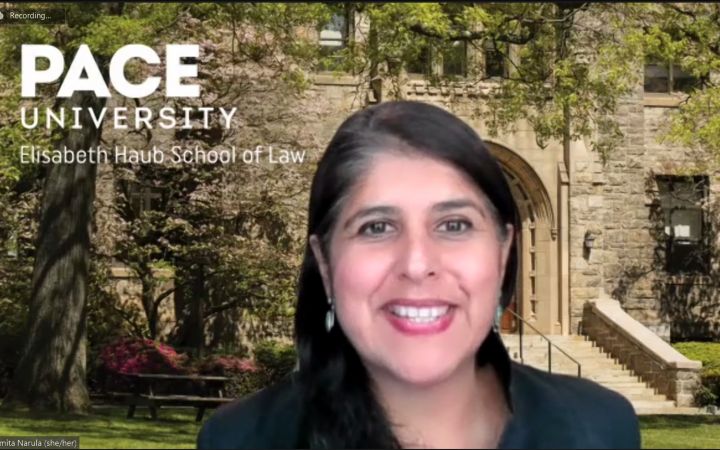Sustainable Agriculture, Labor Rights and Just Transitions in Accelerating SDG Implementation (PART 1)
12 October 2021, New York, USA - United Nations for Training and Research office in New York, in collaboration with Yale Center for Environmental Law & Policy, launched part 1 of Looking Towards COP 26: Sustainable Agriculture, Labor Rights and Just Transitions in Accelerating SDG Implementation. The course focuses on several SDGs like SDG 2 Zero Hunger, SDG 9 Industry, Innovation, and Infrastructure, and SDG 13 Climate Action and was attended by approximately 61 participants.
Mr. Marco A. Suazo, head of UNITAR office in New York, welcomed the panelist and participants. He talked about the longstanding partnership with Yale in creating events that support the climate change. Mr. Suazo mentioned how UNITAR aligns its values with Conference of Parties (COP) focusing on eliminating factors that affect our climate, taking into account that the climate is already changing. He mentioned that one of the ways for UNITAR acknowledged the issues of climate change and its interconnections with the Agenda 2030 was by creating an E-learning course called “Harnessing Climate & SDGs Synergies”. Mr. Suazo the passed the floor to Ms. Nadia Ahmad, Visiting Associate Professor, Yale Law School; Associate Professor of Law, Barry University.
Ms. Ahmad discussed how this course is meant to highlight the issues and concerns from absence of agriculture in the 2030 agenda to find solutions and ways to overcome such issues. She mentioned how this session is a way of looking for ways to provide solutions for governments and international organizations to deploy new production capacities to be able to improve innovation and farming techniques. Ms. Ahmad then yields the floor to Dr. Zitouni Ould-Dada, Deputy Director, Office of Climate Change, Biodiversity, and Environment, Food and Agriculture Organization.
Dr. Dada talked the implementation of the Paris agreement in COP 26 and finalizing the rules. He mentioned about the alarming situation on climate change based on IPCC report. He discussed how vulnerable communities and countries are because of they rely on natural resources and agricultures.. Dr. Dada mentioned that not only does climate change affect crop production but also affect water availabilities, fisheries and other aspects of food supply. He discussed solutions to improve the climate change crises like globally keeping the temperature below 1.5 degrees Celsius, make agriculture a central part of the climate change solution, invest more in R&D and innovation to tackle the food security, stop wasting food and support vulnerable communities like small farmers.
Mr. Ernesto Hernández-López, Professor of Law, Chapman University, took over by discussing Mexico wanting to control biotechnology in for sustainable farming using the example of planting GMO corn. He mentioned how banning GMO corn will support small farmers, creates biodiversity and results in sustainable farming. Ms. Robin Happel from Yale University then took over introducing Ms. Erum Sattar, Sustainable Water Management Program Lead, Institute of Environment, Friedman School of Nutrition Science and Policy, Tufts University.
Ms. Sattar focused her conversation on how disruptive the climate change norms are towards agriculture which is an issue for sustainability. She mentioned that one of the growing ideas is that food is medicine; therefore she talked about the implications that need to take place for better eating and growing practices to reduce malnutrition. Ms. Sattar discussed how waterways are suffering because of agricultural practices that causes nutrient loading.
Ms. Ipshita Chaturvedi, Partner, Dentons Rodyk, took over the session by discussing the finance aspect of traditional agriculture to be more sustainable. She mentioned in order to tackle these issues; we need to have common understanding sustainability within agriculture. Ms. Chaturvedi discussed some examples of legal contours of sustainable agriculture.
Ms. Hapel then introduced Ms. Smita Narula, Haub Distinguished Professor of Law, Haub School of Law, Pace University. Ms. Narula discussed the issues faced by peasants and rural workers and how they struggle to access productive resources, save seeds and highly vulnerable to climate shocks. She mentioned under the human rights international law the rights of peasants and other people working in rural areas. The session ended with a very interactive Q&A between panelists and participants.


